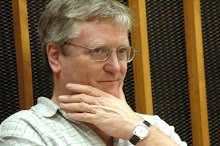Composer Matt Marks, director Karen Simpson and writer Nick Wood at the Oxford University Museum of Natural History
Oxfordshire Theatre Company: A new work
By Nick Utechin
How long should a work in progress take to gestate and produce a result? The answer, so far as the Oxfordshire Theatre Company is concerned, is at least a year.
Some weeks before Christmas, they held an intriguing rehearsed reading and sung performance of what may or may not eventually be called Giants in the Earth.
Let me explain...
The preparatory reading was held in the University Museum of Natural History for an excellent reason: they are developing a piece of musical theatre that centres upon a race in Victorian times to learn from dinosaur fossil discoveries on a beach near Lyme Regis in Dorset and thus ask questions about Creationism.
The Oxford connection comes with William Buckland, who established the university’s first geology department, whose collection is held in the museum and who ended his days in Stonesfield.
The tale is told in word and song of how he met a workhouse girl, Mary Anning, who sold ‘snake stones’ from the beach (and later became the first woman to be honoured by the Royal Society), and how the pair vied with two contemporaries to uncover what would become geological history.
This true story might seem an unlikely subject for a musical production, but the bones of the idea came from OTC’s artistic director, Karen Simpson: “I wanted to do something connecting the arts and science, and something that’s not only about Oxford, but something that would help the company absolutely connect with all the scientific achievements that happened around this area.
“From that, we spread the word and Nick and Matt turned up on my doorstep with a proposal, which took me in a direction I hadn’t necessarily contemplated — fossil hunting!”
Nick and Matt are writer Nick Wood and composer Matt Marks, who have collaborated on projects previously.
The detailed concept of the race and its implications (“Six days to create the world? Impossible. But why can’t a day stand for a million years?”) was theirs: the cumulative pressures on Buckland leading to his insanity contribute to a mix of Darwinism and Dawkins-ism that is irresistible.
And there was another factor, as Marks told me: “We started with a man who not only was responsible for this building, but a man for whom one of his life’s aims was to eat his way through the zoological kingdom! So you have to be interested, don’t you?”
“Buckland ended up as the Dean of Westminster,” adds Wood.
“And had always had a complete belief in the religion that he was brought up; but then his science led him to find out all these things which were slowly disproving it and leading to chaos — not least for the government which became worried about people turning away from the church when it was suggested that the Bible was not literally true.”
The musical content as it presently stands is an interesting mix of chant — to imply prehistoric times – and fun songs like Chip Away — to cover fossil hunting.
Marks, whose influences for this piece are primarily world music and jazz, bridled when I suggested that, as the extracts of the work provided for us stood, there’s much acting and then along comes a song — “If that’s how you perceive it, then we haven’t succeeded”.
Karen Simpson jumped in: “When we were putting together another version of the script this week, and Nick and I were hot over the photocopier, I found we were developing something else: a lot of music, and then two pages of dialogue. So it’s slowly becoming more and more complete.
“Oh, and we’re not even sure yet that the title, Giants in the Earth, is right. What d’you think?”
For what it’s worth, I think it’s a very good one. The process is intriguing and the potential undoubted.
A public rehearsal put on many months before the final production in front of interested parties is unusual.
I look forward to the real curtain-up.


No comments:
Post a Comment